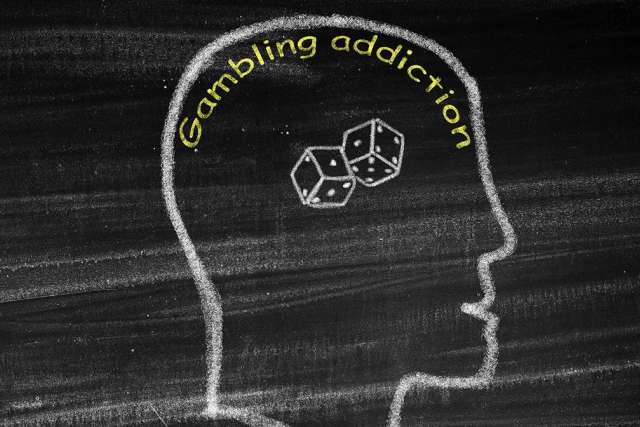Gambling dates back to at least the first millennium BC, eventually evolving into a widespread source of entertainment. However, along with its growing popularity, gambling also has led to significant financial loss and psychological and physical hardship.
Dr. Timothy W. Fong, clinical professor of Psychiatry at the , discussed how gambling can affect the mind, body and brain.
The health impact has been magnified during the pandemic, as more and more people have turned to gambling, experts say.
“There’s a wide range of consequences that comes with gambling disorder (formerly referred to as gambling addiction or problem gambling). Like any addiction, the damage can be to a person’s body, their brain or their mind,” Dr. Fong said. “But the common problems we see when people come into treatment are going to be things like large financial debt, a loss of time, loss of productivity and damaged relationships.”
Dr. Fong noted that studies have found when people struggle with gambling disorder, chances are they are going to have related health problems stemming from stress, lack of sleep and even heart problems. Much of those health issues are associated with large debts accrued from gambling and from not taking time for self-care or health maintenance.
Cognitively similar to drugs
Like addictive drugs such as cocaine, heroin, nicotine and alcohol, gambling activates the brain’s reward system, which is powered by dopamine. Dopamine is a neurotransmitter inside the brain that reinforces sensations of pleasure and connects those sensations to certain behaviors or actions.
Dr. Fong, however, highlighted a significant contrast between gambling and addictive substances.
“Gambling, unlike any other addiction, is associated with cognitive distortions,” he said. “People say, ‘If I keep gambling then eventually I’ll win.’ You don’t say that about alcohol, tobacco or cocaine.”
The cognitive distortion often takes place within people who have lost large amounts of money or other assets due to gambling. Sometimes their pride, ego or sense of despair drives them to gamble more, in hopes of making back what they lost, Dr. Fong said.
What causes a gambling disorder?
There are multiple reasons for why someone might become addicted to gambling.
“It’s the same as what causes any other addiction. It’s a combination of biological risk factors, psychological risk factors and social risk factors,” Dr. Fong said.
“It can be someone with a family history of addiction; someone who has untreated mental health problems like depression, anxiety, ADHD; or someone who is around a lot of gambling, with access to money and it sets up a recipe as to why people fall into problems,” he said.
Dr. Fong explained that people with gambling disorder psychologically view gambling as the answer to their problems. When they are at this point with their addiction, gambling is no longer seen as entertainment. They now view gambling as a means to cope with anxiety or stress, or as their primary source of income.
Gambling during the pandemic
Dr. Fong said the pandemic could be one reason that gambling has increased recently.
“Our experience at the is that there are more opportunities to gamble during the pandemic. There were online games available and casinos stayed open,” Dr. Fong said.
Casinos and online gambling were among the few entertainment options that remained available for people during lockdowns and quarantines.
“In my opinion, the pandemic and all of its related stress and trauma could easily drive people to begin gambling and/or return to gambling as an emotional comfort measure.”
Most addictive forms of gambling
All forms of gambling are potentially addictive, Dr. Fong said. However, he said he notices a trend in California – most people coming into treatment are reporting that slot machines are their preferred form of gambling.
He noted that gambling that is rapid, or that allows you to place multiple bets at one time, tend to be very addicting as well.
“We know that gambling that is anonymous, where you don’t have to interact with anyone, can be addictive,” he said. “Also gambling that is tied to really large immediate payouts like slot machines can also be enticing. When you bet small amounts trying to get the huge jackpot, that’s definitely a risk factor.”
Technology has made gambling more accessible for compulsive gamblers, with people able to place wagers from their smartphones. Some people link their credit cards to digital gambling apps and can add money with a push of the “send” button. Dr. Fong acknowledges that this leads to additional problems.
Assistance for people with gambling disorder
Many gambling establishments and gambling apps are putting safeguards in place for people who might have gambling disorders.
Some casinos have self-exclusion programs, allowing people to ban themselves from the establishment. Some gambling apps have installed software that allows users to manage their gambling impulses.
Though a gambling disorder can cause myriad problems, there are ways to overcome it.
“If they come into the office, we do what we do for any other addictive disorder,” Dr. Fong said. “We do psychotherapy, we have Gamblers Anonymous, we have medication, and strategies to get people to work hard on their recovery, where their addiction can be contained.”
For more information on gambling disorders, visit the .
If you are concerned about your gambling behavior or someone else’s gambling, call the California Department of Public Health at 800-GAMBLER, for access to free confidential treatment.




